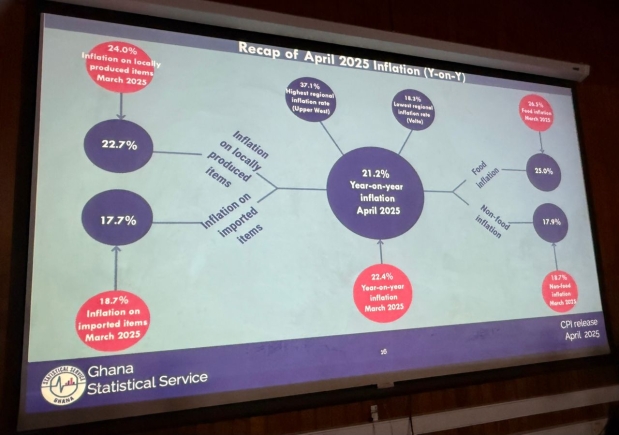Ghana’s consumer inflation has continued on a downward trajectory for the fourth consecutive month, dropping to 21.2 per cent in April 2025 from 22.4 per cent in March, according to new figures published by the Ghana Statistical Service (GSS).
The decline reflects easing pressures across both food and non-food categories, yet food inflation remains high at 25 per cent, posing an ongoing challenge for households and policymakers alike.
At a press briefing today (May 7, 2025) in Accra, Government Statistician Dr Alhassan Iddrisu explained, “Year-on-year inflation slowed to 21.2 per cent in April 2025 and this is largely driven by a moderation in both food and non-food prices, though food inflation remains elevated.”

Despite the annual slowdown, monthly inflation edged up to 0.8 per cent in April, from 0.2 per cent the previous month—an early sign of renewed upward price pressures, particularly within the food segment. “On a month-on-month basis, food inflation increased, whilst non-food inflation was maintained,” Dr Iddrisu added.
Inflation figures showed a notable split between locally produced and imported items. Domestic goods registered a year-on-year inflation of 22.7 per cent, significantly higher than the 17.7 per cent recorded for imported items. Month-on-month inflation for local goods was also twice that of imports, highlighting internal supply constraints as a key inflation driver.
Economists say the figures underscore Ghana’s complex inflation landscape, where external price stabilisation is being undercut by lingering local inefficiencies, especially in food production and distribution.
The continued decline in inflation may offer some policy space for the Bank of Ghana, which surprised markets in March with a rate hike aimed at arresting inflation expectations. Governor Dr Johnson Asiama is expected to re-evaluate the policy direction at the central bank’s next Monetary Policy Committee meeting in May.
Finance Minister Dr Cassiel Ato Forson has meanwhile maintained that the government’s fiscal restraint will help push inflation down to 11.9% by December 2025, aligning with medium-term economic recovery targets.
The GSS also issued several policy recommendations in its April Consumer Price Index release. These include targeted interventions for food markets, especially monitoring inflation-sensitive items such as ginger, beans, and vegetable oil, and accelerating the roll-out of the Agriculture for Transformation Programme.
“The government must sustain macroeconomic stability measures and strengthen social protection schemes to shield vulnerable groups from the impact of inflation,” Dr Iddrisu urged. These include the LEAP programme, Capitation Grant, National Health Insurance Scheme, and school feeding interventions.
Recommendations were also extended to businesses and households. The GSS called on firms to consider easing prices or rebuilding margins where input cost pressures have declined, especially in food and hospitality sectors. Households were advised to manage spending prudently and remain alert to changes in transport and food prices.
